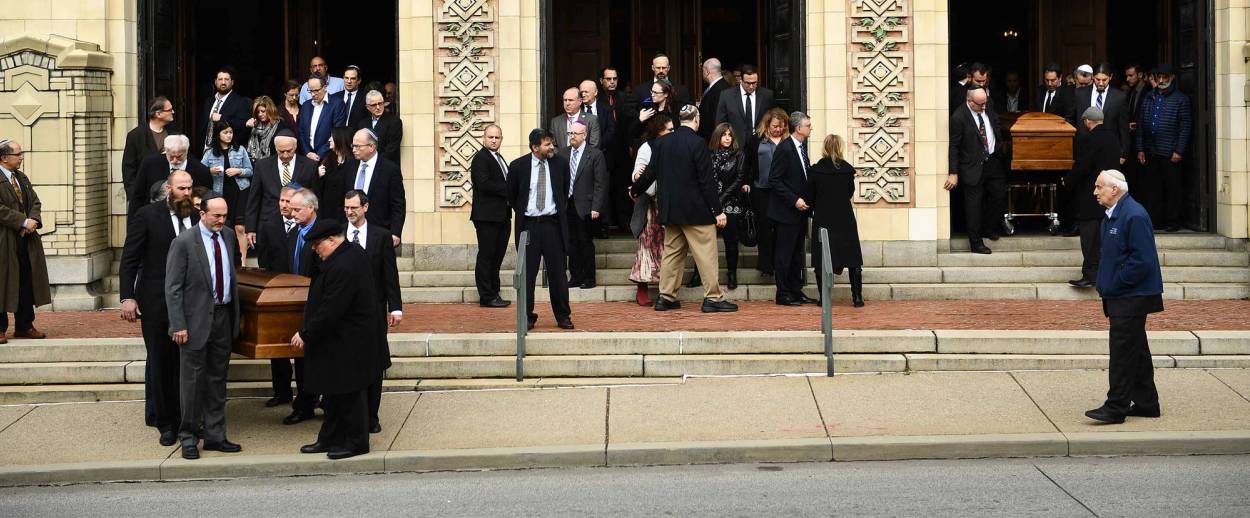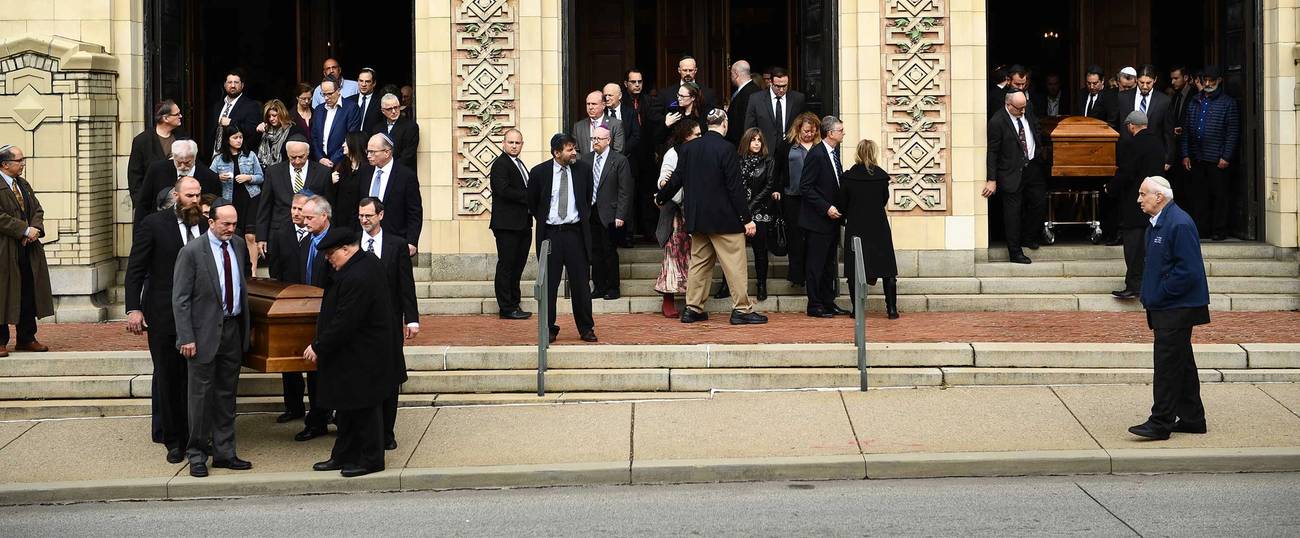The Funeral of David and Cecil Rosenthal
The brothers, victims of the horrific attack in Pittsburgh, weren’t just the greeters at Tree of Life, they were ‘the righteous people of this generation—and now everybody knows’




David and Cecil Rosenthal were murdered by a gunman at Tree of Life synagogue on Saturday morning. The two brothers had lived together in Pittsburgh all their lives, and their deaths left the large crowd of mourners at their funeral at Rodef Shalom this afternoon with an overwhelming sense of loss. “Friendship,” one mourner told me, when I asked him what he had lost. “Innocence,” said another.
Every seat at the brothers’ funeral, which lasted only a little over half an hour, was full. The sanctuary was full, as was the area behind the seats and on the sides, along with much of the central aisle space. So was the entire balcony. The speakers at the funeral faced a semicircular window of stained glass with a rainbow sunburst and the words SEEK PEACE AND PURSUE IT arching over the top. But there was no reflection from any of the speakers on any potential meaning of the event. No one contrasted the brothers with their murderer, and no one tried to reason through the hatred that had killed them. The eulogies were about the brothers only, two mentally handicapped men who had lived their entire lives together.
David was the more taciturn of the two brothers, I gathered during the hour before the service began. One mourner said he’d only heard him speak a couple of times before. Cecil was a large and strong man. You had to brace yourself when he shook your hand; sometimes he would put his hands together and bow. Over the course of his life, Cecil and his brother shook hands with seemingly every Jew in Pittsburgh. They weren’t just the greeters at Tree of Life, one mourner said, “they were everyone’s greeter.” They were “all good, without an ounce of bad,” “the righteous people of this generation—and now everybody knows.”
Prior to the service, mourners lined up to greet the brothers’ two surviving siblings, Diane and Michelle Rosenthal, as well as their elderly parents, who stood in a covered courtyard below the main sanctuary. Michelle Rosenthal is the former public relations head for the Pittsburgh Steelers football team, whose presence at the memorial wasn’t limited to their current roster: Ben Roethlisberger and coach Mike Tomlin were in attendance, but so was Franco Harris, one of the most beloved athletes in Pittsburgh history. Most of the gathered mourners had no idea of the athletes’ presence—though it was hard to miss Brett Keisel, the towering former defensive lineman who served as a pallbearer.
Mayor Bill Peduto sat in the middle of the sanctuary, among the large crowd. No politicians spoke. The only people who addressed the funeral for any significant length of time were Jeffrey Myers, the rabbi at Tree of Life and the leader of the Shabbat services where the brothers died, and Diane Rosenthal, who appeared on the bima with her husband, her sister, and her brother-in-law.
The service began with a line of firefighters in dress uniforms who filed past and saluted the two caskets, which were placed so close together that they almost touched. “We are gathered here today … to bid farewell to two of the sweetest human beings you could ever meet,” Rabbi Myers began.
In his eulogy, which concluded the service, Myers described the brothers’ devotion to the synagogue where they had died. “No matter how early I would get there, Cecil was always there,” Myers recalled. David, who often held jobs as a cleaner and was remembered for his fastidiousness, would always make sure that prayer books and tallises were in order as congregants arrived. Cecil was the shul’s official Torah carrier. “They’re probably calling to God, I want to be in the Tree, that’s where I belong,’” Myers said. “Their spirits will stay in the room.”
Rabbi Myers recalled how proud he was at the congregation’s acceptance of the two brothers, who were able to travel to Shabbat services on their own. Cecil had a skill for remembering people’s individual details; David was fascinated with law enforcement and carried around a police scanner, the object he prized most of all.
David and Cecil Rosenthal succeeded in living semi-independent lives with the help of an organization called Achieva, which provides lifelong support for adults with disabilities in southwestern Pennsylvania. But they could live as they did because their community accepted, supported, and valued them as human beings. “It was easy to feel sad over what could have been, had the boys been quote-unquote ‘normal,’” Michael Hirt, Diane’s husband, said later in the service. “But when I think about it more, I realize that we were more enriched by them than they were by us.”
Diane Rosenthal gave the longest eulogy—although after a few minutes, she handed the speech off to her husband. From the pair we learned that David would always begin phone conversations with “‘Hey Michael, the police are looking for you!’ To which I would playful reply, ‘no, David, they’re looking for you!’” For his entire life David would help his mother cook, and would often load the dishwasher. Every year, the Rosenthals would go to the flea market during their extended family visits to Pittsburgh and David would pick out the same two items: a pair of highway patrolman sunglasses and a bottle of cologne.
Cecil “knew everyone in town,” Hirt said, to a room that could not possibly have been any fuller. He was the “town crier” who knew what was happening in seemingly everyone’s life. He “knew if your mother was sick, or if your grandmother had died. … He always affectionately inquired about the well-being of those who were not well.” He liked parties, and jokingly called himself the “party planner” at every event he attended. “I can guarantee he’s looking down on us now asking, are you proud of me?”
At those annual flea market trips, Hirt recalled, Cecil would disappear into a shop to buy greeting cards. This was odd, because he couldn’t read or write anything other than his name. The mystery was solved one day when Diane and her husband received a letter in the mail from him, with the address made out by someone at their care facility. “The card contained nothing but a jumble of letters,” he said. “But somewhere in the letter was his name, clearly spelled out by him.”
***
Additional reporting by Yair Rosenberg. To read more Tablet coverage of the Pittsburgh massacre, click here.
Armin Rosen is a staff writer for Tablet Magazine.